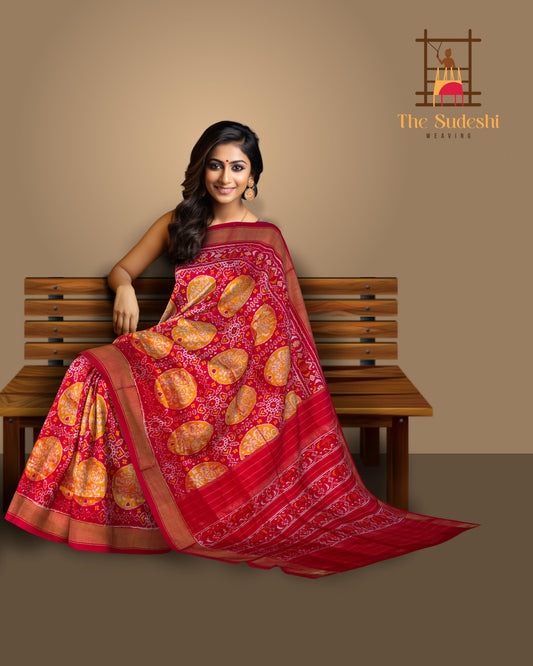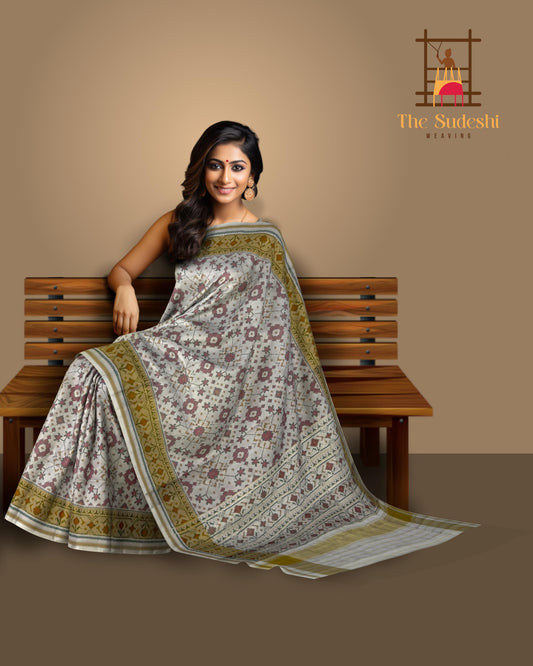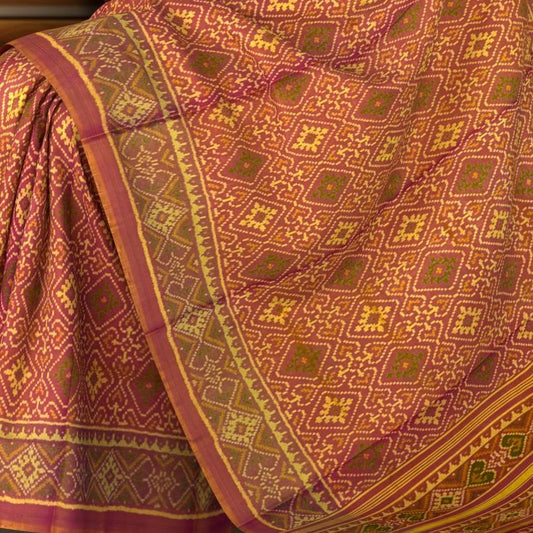The Economic Impact of Patola Sarees: Boosting Local Economies and Preserving Tradition
Patola sarees, known for their intricate designs and vibrant colors, are a testament to India's rich textile heritage. Originating from Patan in Gujarat, these handwoven masterpieces are not only symbols of cultural pride but also play a crucial role in supporting local economies. This blog explores the economic impact of Patola sarees, focusing on their contribution to local economies, the employment and livelihoods they provide, and the economic challenges and opportunities faced by this traditional craft.
Economic Importance of Patola Weaving
Historical Significance and Market Value
Patola sarees have a long history, with their roots tracing back to the 11th century. Traditionally, they were worn by royalty and the affluent, signifying their high value and exclusivity. Today, the market for Patola sarees extends beyond India, reaching international customers who appreciate their artistry. The high market value of Patola sarees significantly contributes to the local economy, bringing in revenue and enhancing the region's economic stability.
Local Economic Contributions
The production of Patola sarees involves several stages, each contributing to the local economy. From the procurement of raw materials to the final weaving process, every step supports local businesses and artisans. The sale of these sarees, both domestically and internationally, generates substantial income, promoting economic growth in the region.
Employment and Livelihood Provided by the Industry
Employment Generation
The Patola saree industry is a significant source of employment in Patan and surrounding areas. The intricate weaving process requires skilled artisans, often involving entire families in the craft. This industry not only preserves traditional weaving skills but also provides a steady source of income for many households.
Skill Development and Artisan Communities
Artisan communities benefit from skill development programs and training workshops aimed at preserving and enhancing their weaving techniques. These initiatives ensure that the craft remains alive while providing artisans with the skills needed to improve their livelihoods. Additionally, collaborations with designers and fashion houses can lead to new opportunities and increased demand for Patola sarees.
Women's Empowerment
The Patola saree industry also plays a pivotal role in empowering women. Many women are involved in various stages of production, from dyeing the threads to weaving the sarees. This participation not only provides them with financial independence but also helps in building their social status within the community.
Economic Challenges and Opportunities
Challenges Faced by the Patola Saree Industry
Despite its economic contributions, the Patola saree industry faces several challenges:
-
High Production Costs: The process of creating a Patola saree is time-consuming and labor-intensive, leading to high production costs. This can make it difficult for artisans to compete with cheaper, machine-made alternatives.
-
Limited Market Access: Many artisans lack access to broader markets, limiting their sales potential. Without effective marketing strategies and access to international markets, the full economic potential of Patola sarees remains untapped.
-
Decline in Skilled Artisans: Younger generations often seek employment opportunities outside traditional crafts, leading to a decline in skilled artisans. This poses a threat to the continuity of Patola weaving.
-
Counterfeiting: The market is flooded with counterfeit Patola sarees, which can mislead consumers and reduce the demand for authentic products, ultimately affecting the livelihoods of genuine artisans.
Opportunities for Growth
Despite these challenges, there are several opportunities for the Patola saree industry to thrive:
-
Technological Integration: Leveraging technology for better marketing, sales, and distribution can help artisans reach a global audience. Online platforms and social media can be powerful tools for promoting Patola sarees and connecting with customers worldwide.
-
Government and NGO Support: Increased support from the government and non-governmental organizations in the form of grants, subsidies, and training programs can help sustain the industry. Initiatives to promote traditional crafts can boost the visibility and marketability of Patola sarees.
-
Collaborations and Partnerships: Collaborations with fashion designers, brands, and international markets can open new avenues for Patola sarees. These partnerships can help in introducing innovative designs while maintaining traditional craftsmanship, thereby attracting a broader customer base.
-
Tourism Integration: Integrating Patola sarees with tourism can also create new economic opportunities. Workshops, exhibitions, and craft fairs can attract tourists, providing artisans with direct market access and enhancing cultural tourism in the region.
Conclusion
The Patola saree industry is a vital part of the local economy in Patan and surrounding areas. Its economic impact extends beyond mere financial contributions, encompassing cultural preservation, skill development, and women's empowerment. While the industry faces several challenges, there are ample opportunities for growth and sustainability. By addressing these challenges and leveraging available opportunities, the Patola saree industry can continue to thrive, contributing significantly to local economies and preserving a cherished cultural heritage.
In the broader context, the story of Patola sarees is a reminder of the importance of supporting traditional crafts and the artisans who keep these traditions alive. As consumers and stakeholders, our appreciation and support can make a substantial difference in sustaining these age-old crafts and the communities that depend on them.







Leave a comment
Please note, comments need to be approved before they are published.